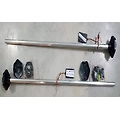


In today’s world, where technology is deeply embedded in our daily lives, advancements like Fuel GPS Tracking Devices have emerged as game-changers, especially in the transportation and logistics sectors. These devices not only improve operational efficiency but also aid in cost savings and environmental conservation.
A Fuel GPS Tracking Device is a technology that combines vehicle location tracking with fuel usage monitoring. It provides data on vehicle position, speed, and routes while simultaneously tracking fuel consumption and levels. This dual functionality allows fleet managers to optimize operations and reduce costs effectively.
Cost Savings
Fuel expenses are a significant portion of operating costs for companies relying on transportation. Fuel GPS Tracking Devices help in monitoring fuel consumption patterns, identifying inefficiencies, and addressing issues like fuel theft or leakage. This enables businesses to control costs and use fuel more efficiently.
Better Fleet Management
Real-time GPS tracking allows managers to oversee vehicle movements and optimize routes. It helps minimize idle times and unnecessary travel, improving overall fleet performance. When combined with fuel monitoring, this technology ensures more economical and efficient operations.
Encouraging Safe Driving
These devices can analyse driving behaviour, including habits like rapid acceleration, harsh braking, and excessive idling. Addressing these behaviours not only improves fuel efficiency but also reduces maintenance costs and enhances road safety.
Fuel Theft Prevention
Sudden drops in fuel levels can indicate theft or leakage. With alerts provided by the device, fleet managers can address these issues promptly, ensuring the security of company resources.
Environmental Impact
By optimizing fuel usage, these devices help reduce carbon emissions, making them an eco-friendly choice for businesses. Efficient fuel use contributes to a cleaner environment and supports sustainability goals.
Data-Driven Insights
Modern Fuel GPS Tracking Devices generate comprehensive reports on fuel usage, vehicle performance, and route efficiency. This data enables managers to make well-informed decisions, plan for future needs, and identify areas for improvement.

These devices are extensively used in industries such as logistics, transportation, agriculture, and construction. Companies use them to manage delivery vehicles, public transportation, and heavy equipment. Individual vehicle owners also benefit from these devices by monitoring their vehicles' fuel efficiency and usage.
Although beneficial, Fuel GPS Tracking Devices have some drawbacks. The initial setup and maintenance costs can be high for small businesses. There may also be concerns over data privacy, as these systems collect sensitive information about vehicle operations and locations.
Fuel GPS Tracking Devices are a valuable innovation for improving fuel efficiency, enhancing fleet management, and ensuring environmental sustainability. While the initial investment may be significant, the long-term benefits in cost savings, operational efficiency, and reduced environmental impact make these devices a worthwhile investment. As technology advances, these systems are likely to become even more refined, further revolutionizing transportation and fuel management practices.